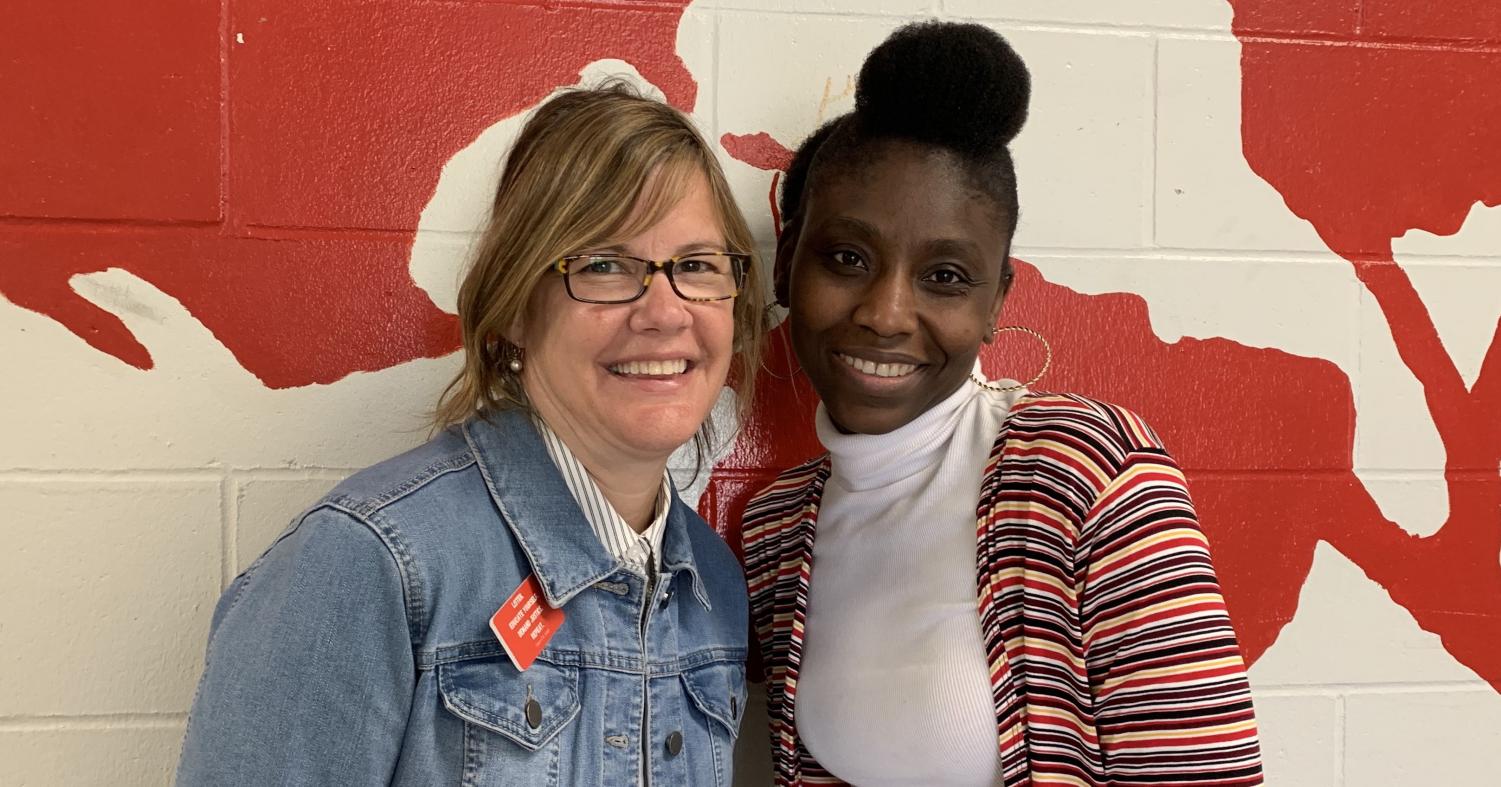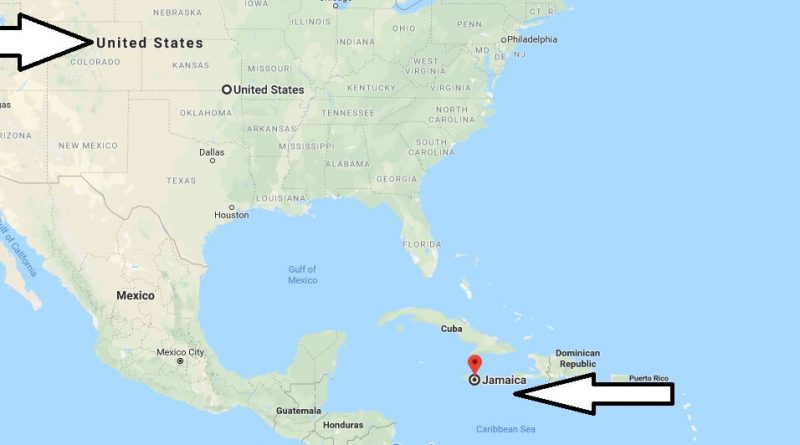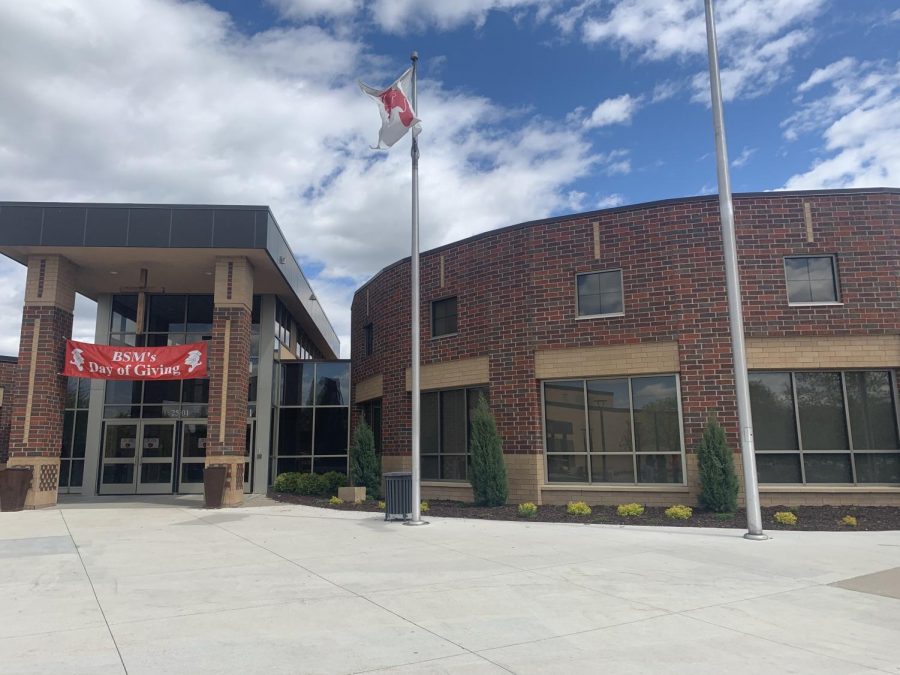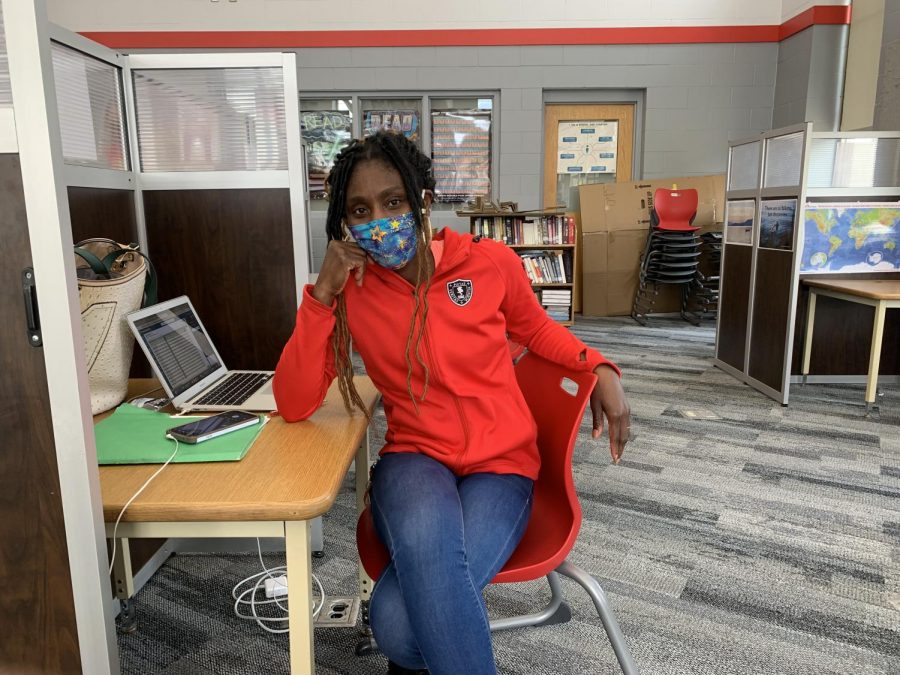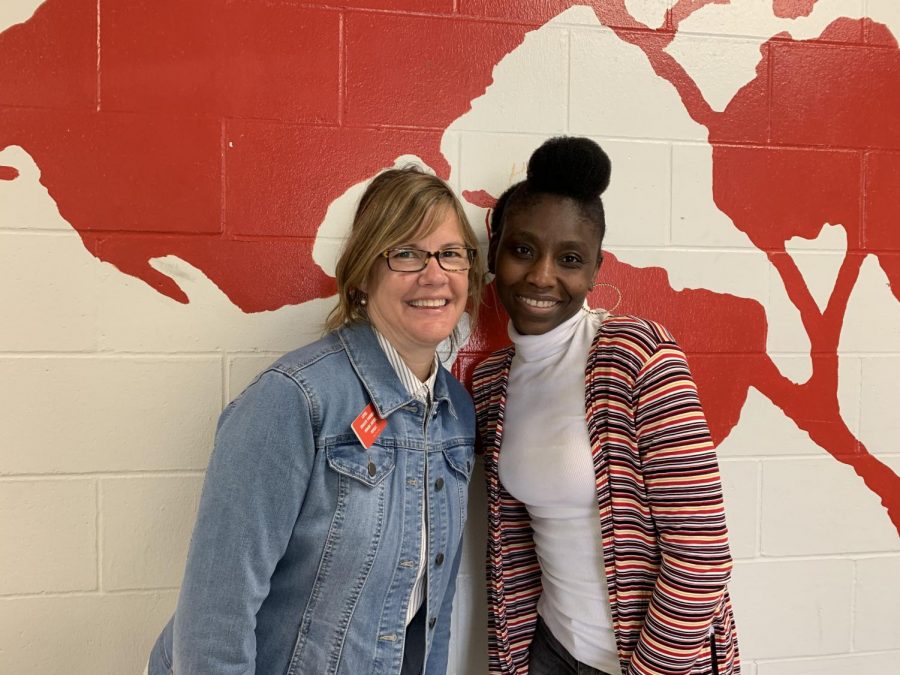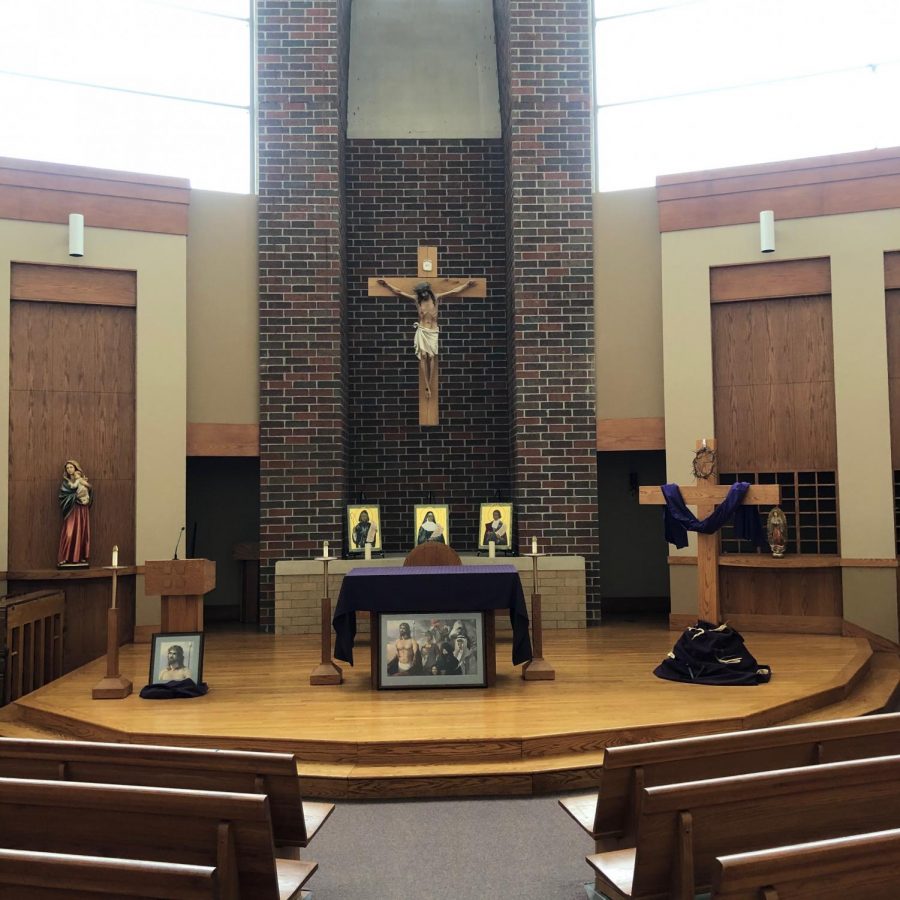From Kids to Colleagues: An Oral History
June 2, 2021
Thirty-one years ago, two BSM teachers, Ms. Michelle LeBlanc and Ms. Andretta Hanson, met in Jamaica. Since then, they have united and reunited through families, friendship, and faith. This is their story.
From Separate Paths
While attending the UNiversity of St. Thomas, Ms. LeBlanc visited Jamaica, Ms. Hanson’s home country.
Ms. Michelle LeBlanc: In 1988, I had the opportunity through the University of St. Thomas as a sophomore in college to spend a semester in the mountains of Jamaica at a Jesuit mission called St. Mary’s.
LeBlanc: I did not meet Angie yet, but she lived in that same village––called “Above Rocks.”
Ms. Andretta Hanson: I am from a huge family, I should say. I grew up with my grandfather, my grandmother, my mother, my mother, uncles, aunts, cousins: huge family. So we lived in a little district called Above Rocks. It’s in the parish of St. Catherine. We grew up in a mostly Catholic household.
Hanson: I grew up in a… between poor and middle-class family. That didn’t matter because we grew up as a happy family. The forest is a tropical country, so there were a lot of activities within my daily routine. So I would get up in the mornings, probably do a chore, then I’d go to the rivers to take a bath, come back and be ready for school at about 7 am. So we’d eat breakfast and then dress in our pristine uniforms. I’ve never not worn a uniform to school until I came to BSM. [We would] get our education, then back home, do a chore, get our homework done, play outside––because at that time we didn’t really have access to video games and all this technology. As a matter of fact, for a period of my life when we grew up, we didn’t have any electricity at our home. So we used kerosene oil lamps for light. We would study under those lights. We knew that it existed, but we just didn’t have it in our household. Nor did we have electric stoves, so when we did our cooking, it was always on a wood fire, which was pretty delicious and healthy and fresh, because we’d pick fruits from the trees or dig yams from the yard. And we raised our own chickens: our neighbors had cows and goats and pigs and all that so [we had] different types of meat, but it was all freshly produced.
Hanson: When I see what the kids are doing nowadays––even my own kids––you know, ‘I’m like wow, I wish you were back in my day when you would get to go down to the rivers, you could cook on the riverside, you know just enjoy nature instead of just sitting down in front of a screen.’ It was fun, we played ball games, we made our own toys, we played with the neighbors, we’d go out on field trips and stuff like that. I had a very good, fun childhood.
The Beginning
LeBlanc: So when I finished with my spring semester…there was a hurricane in Jamaica called Hurricane Gilbert. In January, I organized a group of St. Thomas students to go back to Above Rocks and help clean up, rebuild, and stuff like that.
LeBlanc: So this friend of mine from St. Thomas, who was living there and doing his study abroad, introduced me to Angie––Mrs. Hanson––and her family. She was seven. Then, as a senior, I had a chance to do my student teaching in the same school. Even though I was studying secondary education and theology, my professors let me take any job St. Mary’s needed me to do. So they said, ‘We need a third grade teacher,’ and I said, ‘I will study and do my very best!’
LeBlanc: So Angie was in my third grade class in 1990. And she and her aunt––who are the same age–– were the two brightest kids in the class, and their family lived across the road from the church and this whole campus of schools…so they were like my unofficial host family. They were the ones who showed us what the ‘real’ Jamaica was like. It was a lot of doing jigsaw puzzles, doing homework, singing songs, making up games, visiting… It was a lot of really simple connections without doing outings or anything like that.
LeBlanc: It was really a lot of work teaching 3rd grade, and it was really jam-packed with 43 fantastic students. During lunch one time, Angie and her friend Tina came and sat at my desk and Tina got up to leave, and I said ‘Angie, you and Tina are really close friends, aren’t you?’ and she said ‘Yes miss, we even share our lunch.’…And they had enough food, but just enough food, and when there’s food scarcity and so forth, it was like okay that’s what it means to be a friend. And to me, that was as profound––or even more so––than the Eucharist.
Hanson: During the elementary time of my life, that’s when I met Michelle LeBlanc. [She] and my family had a very close bond. So we were the ones who welcomed her to the community, we showed her around, we cooked for her, and she was one of my reading teachers…so that’s where the connection formed.
LeBlanc: So ‘88 was my first time in Jamaica, so all the way through ‘98–– so ten years––I managed to do another student teaching, and then for about seven years in a row, I took high school students on mission trips there, and Angie’s family would be instrumental in hosting us.
A New World
LeBlanc: I kept track of Angie, and I would see her at 10 years old, 11, 12, 13, doing so well in school. And they finish school in 11th grade, she’s top of her class, and [there’s] very few opportunities for anything past that. I asked [Angie and one of her friends] if they wanted to come and be exchange students in America to do 12th grade, and she said absolutely––her friend was too shy to come.
Hanson: In my community, we have a kindergarten school which we call infant school, we have an all-age school (elementary), and we have a high school. So I attended all three. I started high school in 7th grade…there is a Caribbean-wide examination that you take to place you into high school, so I started in 7th grade all the way through eleventh grade. After 11th grade, that’s when I came here to BSM as an exchange student for 12th grade.
Hanson: The first time LeBlanc asked to bring Hanson back to the US, she was turned down. “I remember when I was 8 or 9 years old, [LeBlanc] had a conversation with my mom. And my mom was like, ‘No. You can come back in a couple of years when she is done with high school. Michelle was like, ‘ok.’ And she did, she came back. She actually kept her word, she came back and asked my mom again, and she said, ‘Yep, you can have her now!’
LeBlanc: I made one phone call to Benilde-St. Margaret’s, and I just told him about Angie and he said she can come. She lived with us for the first semester, and she lived with another host family for the second semester.
Hanson: Yes, it was a culture shock. Yes, it was a major climatic change––with the weather and all that you know. I came here in the summer, and a couple weeks after, I was like ‘Wait what’s happening, I can’t move, I’m frozen!’ So it was a major shock.
Hanson: It was a good cultural experience. There were some things that I saw and experienced myself and I was like wow, I never knew that. Good and bad. But I’m not saying bad in a grudgeful way; it’s also good at times to experience bad…so you know how to handle it. I had a good learning experience here at BSM.
Post-BSM
Hanson: Then after BSM, I went back home for a couple months, then I got accepted at the University of St. Thomas.
LeBlanc: My husband…made a few phone calls to St. Thomas, and because Angie had such good grades, she got a Presidential Scholarship to St. Thomas. So she went home for a year because it took a while to get everything straightened out. And then she came back here and lived on campus, but we were like her weekend family.
LeBlanc: She walked on to the St. Thomas track team, and she’s super coachable; she wound up a national champion. And so my whole family went to see her at the national meet in Iowa, where she won the long jump.
LeBlanc: She studied communications at St. Thomas, and the whole time she was there she said she was going back to Jamaica to work.
Hanson: [After college,] I went back to Jamaica and worked in the media industry. So I worked in the media industry as a television producer for about 12 years; it’s one of my favorite careers that I’ve been in.
LeBlanc: [Seven years ago,] my daughter and I went to see Angie in action. We got to go to the capital city and see her cover the national track meet, which is like their Super Bowl. Usain Bolt shows up to that every year.
New Opportunities
BSM alum, Ms. Andretta Hanson spends her days teaching a theology class and being the building’s sub.
LeBlanc: [Angie] and her oldest son Devandre, who’s 13 now, came back to America about six years ago to apply for citizenship. The daily wage there is almost impossible to feed yourself on, even with a good job like television production.
LeBlanc: So when Angie [came back to America,] she was hustling trying to find something to do in television; it’s really hard to break in.
LeBlanc: And one day I was like, you could sub! So she tried it, and she really liked it and the kids really liked her, and so all last year she subbed when she could. And this year they offered her the full time in-house sub.
LeBlanc: So she’s here every day, and now she coaches junior high track too. And so she’s a really valuable part of our affinity group, whenever she can she comes to eat lunch with the affinity students.
Hanson: I am a part of the affinity group; I try to have a good relationship with the members of the affinity group. Because, you know, in reality, people of color––I don’t like that word at all, but you know, it’s used in the American culture––people of color here at BSM, it’s a very small group. So we have to support each other. There are things that make us feel uncomfortable at times. As an adult, I am more experienced in handling situations like that, but for the younger ones, myself giving them support is for the betterment of their state here at BSM. I’m just glad to be a part of it to help them.
Hanson: They did not have an affinity group [when I went to BSM]. But I can tell you that, comparing the cultural environment now to when I was at BSM, it’s a major improvement. The people of color ratio is much higher than when I went to BSM.
Hanson: With my own experience…I did meet a lot of friends here, you know…a lot of friends who are African, other Caribbean nationalities, Indian. And they are brilliant people, in a lot of ways, whether in academics or brilliant in some type of technical field. And I see that [in] the culture here, they welcome you because you can be beneficial to the society with your talent, however they don’t appreciate you when your back is against the wall.
Hanson: [For example,] say I’m at a workplace doing well, and then some racial thing flares up. I find it that our employers would be hesitant in defending us… You claim that I am one of your best employees, but now that I need your help, in this crucial moment, you’re backing away. So, I do find that things of that nature do happen.
Hanson: So when we see that, I find that a lot of people are under the impression that everybody wants to come to America and all the immigrants want to take over America, but it’s not the case. In reality… we’re from countries that don’t offer that many resources. So of course you’re going to gravitate towards the higher monetary rate so that you can be able to support yourself and family. So that’s one of the main reasons people will immigrate to America… because of economic opportunities.
An Everlasting Connection
Teachers Michelle Leblanc and Ms. Andretta Hanson have a relationship that spans decades.
LeBlanc: When Angie came to live with us… I was pregnant. Once Sean was born, he would just smile and smile and couldn’t get enough of Angie.
Hanson: Michelle LeBlanc and our families kept that bond over the years. Really really strong and special. She comes back to Jamaica back and forth and all that stuff.
Hanson: She’s planning to live in my community of above rocks. A couple years ago…we were down at our family lot, and she was like ‘I want this spot right here, this is where I’m gonna build my little hut,’ so yeah, over the years, our friendship has… just been a long-term, permanent friendship; like family. She’s the godmother to one of my sons, and he goes to Little Knights. We’re family, we go to each other’s houses, events, our kids are like brothers and sisters…we are best friends.
God Is Good
Hanson: My faith is extremely important to me. When I was growing up, it was taboo if you didn’t get up on Sunday mornings and go to church with grandma. It was so embedded in us, that if we missed a day of church we would think ‘is God looking at me?’ I mean, I may not have had a good understanding of what faith was at that time––because of course, I was just a little child––but I understood that it was very important to my family. I grew up in the Catholic faith, and I started going to Sunday school and Bible classes and Wednesday worship and all that stuff.
Hanson: From a young age, I realized that even though I was so busy with playing with friends or doing my homework or having other distractions, I had to find some time to give my time to that higher being. So from that young age growing up to who I am today, I stuck with my faith. Because throughout my journey in life, I realized that without my faith in God, I wouldn’t be the person I am today or where I am today. So I kept my faith, and I’m not perfect, but I still hold on strong to God and still worship and give Him thanks for all his grace and mercies. And it’s been going good so far.
Hanson: God has been good. He’s been doing a lot for me, a lot for my family, and no matter what the circumstances are, I can always feel his presence and know not to worry about it. It’s going to be okay.
LeBlanc: I was at Angie’s house a couple years ago. Braden was a baby, and all of a sudden her phone was beeping, and I said, ‘Oh Angie, I think you got a call.’ And she goes, ‘Oh no, that’s just my little reminder to pray.’ That is so cool. She and God are really close. And that’s really inspirational to me too–– little habits that remind us that people and our relationship to God is important.
Wisdom and Reflection
LeBlanc: I think if you’re interested in going on a ‘mission trip,’ you also have to be open to immigrants coming here. Welcoming refugees here––economic refugees, war-torn country refugees, any kind of asylum seekers––I think you ought to be sure you can keep that in balance. It’s not easy.
LeBlanc: If you have the chance to study abroad…I say take every opportunity, even if it’s for a week. But in college, if you have the opportunity to get a semester or a year, I highly, highly recommend it because, for me, I learned more about America by looking at it from the point of view of jamaica. And then, just, lifelong friends!
LeBlanc: I felt some of the most achy loneliness in my whole entire life at the times I was studying abroad in Jamaica, but I learned, I’d say, tenfold compared to other semesters at school, and also it is a second home. So it’s worth the loneliness.
Hanson: I don’t mean any harm by saying this but as an exchange student… I see that some students are still stuck in their own little bubble––in terms of words that they’ll use, or actions, or things that they’ll see.
Hanson: I remember my first time here, a particular student said to me, ‘So I know that all Jamaicans have treehouses,’ and something about our clothing. In that moment, I kind of laughed, but I found it to be an opportune moment to educate that student. I didn’t shun her away, and I wasn’t degrading to her, because it was an opportune moment to say, that is false; I have a perfectly nice house, just like in America, and we do regular stuff.
Hanson: But fast forward to this moment, you still do have students here and sometimes adults who will make comments like that. So I would be elated to take BSM students to my community. I would like to take some students to a ministry program, or a volunteer program, to Jamaica. And I see this as a very great opportunity for BSM students to experience another culture; because as high school students, it’s not healthy for you to be stuck in your own bubble.
Hanson: When you leave BSM, you’re going to go out here in the world. When you go to university, you’re going to meet people from countries you’ve never heard of before. You’re going to meet people of different backgrounds, culture, environment, ethnicities, all of that. And you can’t have your own perception about your roommate. You can’t have your own perception about the head of the education board, even the regular person that walks by you each day. And sometimes you have to be careful of the things that come out of your mouth, because not everybody will take things as an educational opportunity. Some people will probably be mad, or shocked, that someone will say something like that to them as a university student.
Hanson: I think that BSM students experiencing other cultures will be a wide awakening for them and a very good educational opportunity. It’s okay to have an uncomfortable conversation. Being here in your own bubble and floating around, it’s not going to help you. Because when you go out into the world, you’re going to be experiencing different things
Hanson: Presently, I’m doing my masters degree. I’m hoping to finish next spring. I’ve been going hardcore since last fall. I want to finish within a year and a half or two years. When I’m done with my masters degree, I will continue in the teaching field, but it’s my other career, my go-to field. I’m still in the media business, but not full time––my brother is also a television producer. I do help him sometimes. So I still have a love for television. So I’m going back and forth between that and teaching, but I’m not sure if I want to do teaching full time or part time. Next fall I’ll decide.

